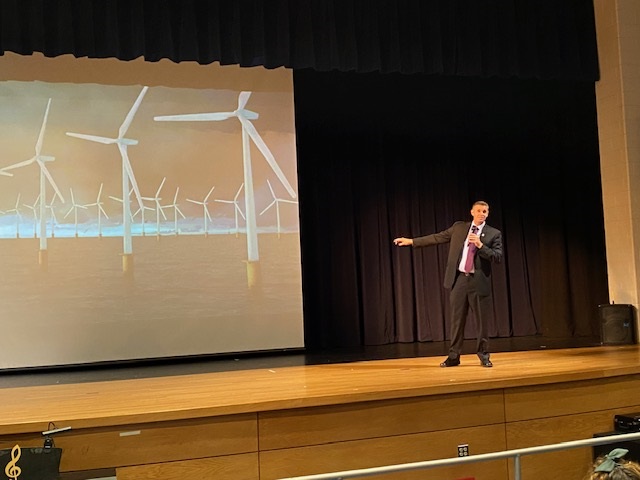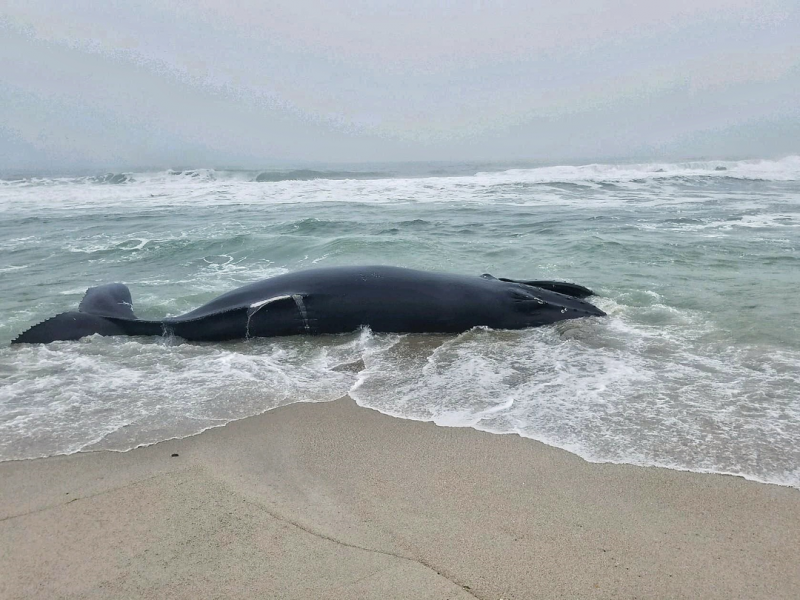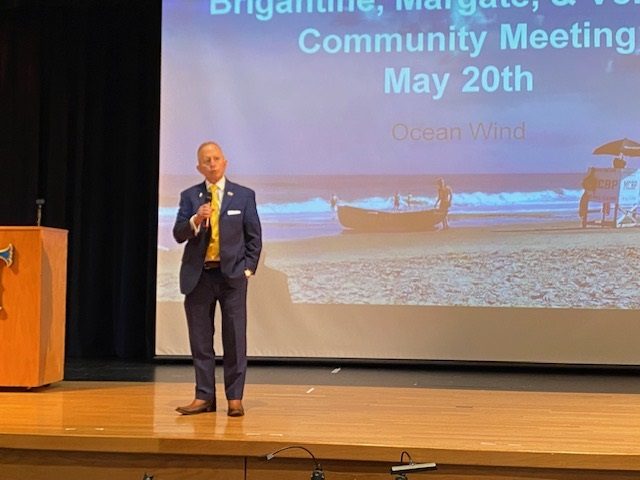By NANETTE LoBIONDO GALLOWAY
About 200 people sat in the Dominick A. Potena Performing Arts Center in Margate on a rainy Saturday afternoon to hear area politicians and advocates seek the truth about the effects offshore wind farms will have on the Jersey Shore.
U.S. Rep. Jeff Van Drew (R-2) said he was concerned about the prospect of building hundreds of wind turbines off the mid-state coastline, but it wasn’t until whales and other marine animals started washing up on the shore that he became worried.
“I had concerns for several years, but it wasn’t until something biblical happened that I got active,” he told the crowd. “You can’t go from having one or two whales wash up to 24 without something being very wrong.”
The deaths of whales and dolphins didn’t start happening until after the Danish company, Orsted, began its project to build wind turbines 8-15 miles off the shoreline. Van Drew said 2 million acres off the coast are included in the leases granted to foreign companies to build the turbines.
“It’s the most ambitious project in the U.S., if not the world,” he said.
Van Drew raised concerns about the potential rise in the cost of electricity for ratepayers, profits for foreign companies, how the wind turbine blades will be disposed of after their 20-year life expectancy, if they will survive hurricane-force winds, and their impact on the fishing and tourism industries at the shore.
Instead of going full force to get the wind farms built, the state and federal authorities should have conducted a pilot program with just a few wind turbines, until their effects are known, Van Drew maintained.
“We should look for a zero-carbon footprint project that doesn’t dump on South Jersey,” he said. “But don’t lie to our people. Tell the truth.”
Van Drew and others who spoke during the more than two-hour meeting believe “it’s all about the money” offshore wind developers will make.
The speeches turned somewhat political, with several speakers pointing to offshore wind supporters Gov. Phil Murphy and President Joe Biden, which brought boos and applause from the audience at times.
“We’ve been having testimony and rallies to speak up,” Van Drew said, instructing those present to write to the governor and senators and urging them not to support their campaigns.
“Tell them, if you support this, I’m not voting for you. Stop contributing,” Van Drew said. “Politicians only care about money and votes. Use that.”
He pledged not to vote for wind energy until all the facts about them are known, he said.
Van Drew garnered a round of loud applause when he said, “At this point, I don’t want to slow it down, I want it to stop. If we are wrong, then we can look at it again.”

Brigantine Mayor Vince Sera, who was instrumental in putting the meeting together, said the project would “impact us for generations if we don’t stop it.”
He shared information about the size of the turbines, which will be almost as tall as the Eiffel Tower and located 8 miles off the coast of Brigantine.
He cited reports by Rutgers University that the cold pool, a layer of cold water just below the surface of the ocean from spring to fall that is vital to the life cycles of marine species, would have a negative effect on sustainably managed fisheries.
Sera said there is no evidence the recent whale deaths were caused by ship strikes because, “the necropsy reports are not finished yet.”
“If they can’t expedite it, something’s wrong,” he said.
He said he invited offshore wind farm developers to come to the meeting, “but they won’t come out to speak. They do not want to answer questions.”
Sera believes electric bills will double or triple, and that the energy generated by offshore wind farms will do little to reduce the country’s dependence on fossil fuels.
“If these things aren’t saving the world, why are we investing in them?” he said.
Dr. Bob Stern, director of Save LBI, a group advocating against the wind farms, delved through thousands of pages in the reports published by the developers. He said they are incomprehensible to read and are an insult to the public.
Not only will the turbines be seen, but they will emit a pulsating sound that exceeds the state’s own noise standards.
“This is not a mild change in the shore experience. It will be a destruction of the shore experience,” he said.
He spoke about the sounds from testing equipment that may not directly damage a whale’s hearing, but Level B emissions will disturb their normal behavior, and lead indirectly to their demise.

Stern said the whales would avoid the noise, block their normal migration routes and cause them to head to the shore where they will be in even more danger. He said the noise would mask communication between mother and calf, and they will lose the ability to navigate, detect ships, predators and prey.
“Things are being thrown out there that don’t make any sense to us,” he said. “They are saying there is a change in their feeding patterns due to climate change. So, what are they dying from, indigestion?”
He said only 20 percent of the whale deaths have been attributed to ship strikes.
“The turbine area was cited in the migration area of the right whale. Someone at BOEM doesn’t like North Atlantic right whales,” Stern said.
He also said the noise from the turbines will radiate out 90 miles, which will block the right whale’s normal migration.
Stern asserted that a global solution is needed to address climate change and the U.S. needs to get buy-in from other countries.
“The damage outweighs the benefits and conveys a lack of respect by foreign corporations for our shores and marine life,” he said.
In Europe, wind farms can only be located 44 miles from land and they must be smaller.
“They are protecting their marine life, but they are coming here and disrespecting ours,” Stern said.
State Sen. Vince Polistina, a Republican representing Atlantic County, said he has attended numerous meetings, including those held by wind energy advocates, “but we are winning the battle in terms of public sentiment.”
Gov. Murphy is rushing completion of the project because he only has two years left to his term, “and the president can’t put three sentences together,” Polistina maintained. “You would rush, too. They want offshore wind, and nothing will stop them.”
He predicted that due to “Biden’s inflation,” offshore wind developers would be coming back to the N.J. Legislature or the Board of Public Utilities to ask for more money. He views that as an opportunity to have a deeper discussion about the benefits of offshore wind development.
“PSEG pulled out because they couldn’t make any money on it for their shareholders. I encourage all of you to stay involved and make your voices heard,” Polistina told the crowd.

Perhaps the most poignant part of the meeting was a presentation by trial lawyer Chris Placitella, a Save LBI member who has a home on Long Beach Island.
“If we make this a partisan issue, we lose. These are not specks on the horizon,” Placitella said, pointing to statements made in the estimated 4,000-page Atlantic Shores impact report.
“The truth is in the report,” he added. “The report says there will be visual impacts.”
Placitella showed various slides that indicate the “largest industrial wind turbine complex in the world” will be visible not only from the shore, but also from the Inland Waterway and from mainland communities.
“The flashing red lights will change the character of the night skies forever,” and will be a major focus of viewer attention that will look like a fence of turbines. They will change the sunrise people enjoy watching from the beach and will industrialize the existing view of the ocean, he said.
“It will damage the perspective of the ocean as pristine,” Placitella said. “It’s all in the report.”
After the meeting, Longport resident Bob English weighed in on all the information presented.
“When I first heard about it, I was for it because we would use less fossil fuel, then the whales started dying,” English said. “There are so many unanswered questions. Without knowing all of the impacts, we shouldn’t move forward. It’s a shame that this has become a partisan issue.”
Former Margate schools Superintendent Dominick A. Potena, for whom the Performing Arts Center is named, said the presentation was “disturbing.”
“Putting up these windmills will destroy our views and make noise. It will hurt the town and the people who live here and visit,” Potena said.









